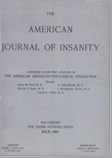NEUROSES AND NEUROPSYCHOSES
Abstract
This paper is an exposition of a point of view based upon intensive clinical observations in a large number of cases of the development of the various groups of symptoms which constitute the neuroses. I have endeavored to show that the neuroses span the bridge between what is conventionally called the normal mental states and certain psychotic states. No claim is made as to the validity of the etiological assumptions. It is here asserted that regardless of one's beliefs and opinions as to the causes of these mental states, the evolution of the symptomatology is correctly depicted and developed in this article. One may hold any point of view one pleases regarding etiology. One may be a Freudian, Jungian, Adlerian, or any modification or eclectic synthesis of the above. One may follow the conventional organistic, physiologic points of view. One may believe with Janet in psychic tension, or with Cannon that the emotional states are to be fundamentally described in terms of physiology. The development of a dynamic symptomatology is not fundamentally based upon any etiological theory.
I have endeavored to reduce the chaotic descriptions of the neuroses to one of order and developmental significance. Since experimentation is at present impossible, and statistical study is so wrapped up with difficulties as to be impractical and invalid, no proof can be adduced, certainly, so far as my own theories of causation are concerned. This, I believe, is true also of those theories that have appeared in the literature.
One may take the immortal statement of Shakespeare concerning the genesis of greatness and paraphrase it so that it applies to the neuroses—some are born neurotic; others achieve neurosis; and still others have neurosis thrust upon them. Those are born neurotic who from the earliest days show fatigue, bodily reverberation, visceral disturbance, disproportionate emotional reactions, obsessive and compulsive feeling and thinking. Those achieve neurosis who persist in ways of life which breed fatigue, profound and continuous emotional disturbance, who select situations which injure egoism, and who in general find their way to trouble by a sort of chemotaxis. Those have neurosis thrust upon them, who through an unavoidable life situation are plunged into a mælstrom of strain, doubt, fatigue and emotional and egoistic distress.
Behind it all is the mystery of the constitution of man. Some react to a situation which taxes endurance without any obvious disturbance. Others become fatigued but maintain an essential integrity; these are merely tired. More vulnerable individuals become involved in their visceral somatic responses and, in a minor way, in their feeling and thinking; these are the neurasthenics. Below this group in the order of endurance and energy is that one in which fear develops excessively, obsessively, disorganizingly; these are the one who have the anxiety neurosis. Still others, more akin to those who develop the true psychoses are the ones who are plunged into an anhedonic, depressive state, become the prey of doubt, compulsive actions, obsessive thinking and feeling and whose hold on reality is precarious. Most vulnerable, most poorly adapted to stand the stresses and strains of existence are those whose personality becomes deeply disorganized, whose disturbed somatic and visceral responses become lasting, whose grip on reality disappears and who, therefore, enter upon a period or a life-time of the falsification of reality and the misinterpretation of bodily processes which I here call the neuropsychoses.
Access content
To read the fulltext, please use one of the options below to sign in or purchase access.- Personal login
- Institutional Login
- Sign in via OpenAthens
- Register for access
-
Please login/register if you wish to pair your device and check access availability.
Not a subscriber?
PsychiatryOnline subscription options offer access to the DSM-5 library, books, journals, CME, and patient resources. This all-in-one virtual library provides psychiatrists and mental health professionals with key resources for diagnosis, treatment, research, and professional development.
Need more help? PsychiatryOnline Customer Service may be reached by emailing [email protected] or by calling 800-368-5777 (in the U.S.) or 703-907-7322 (outside the U.S.).



